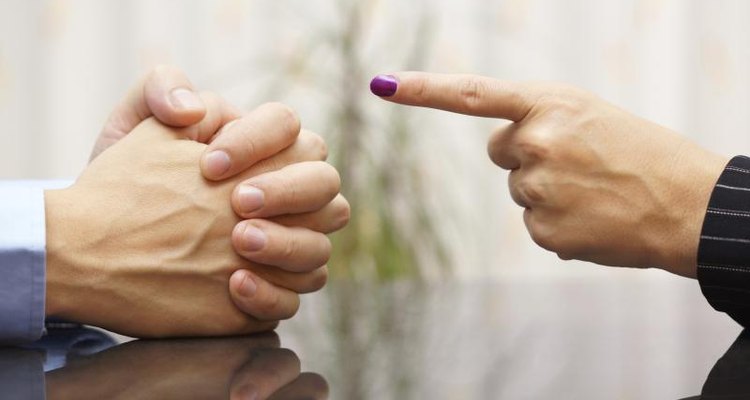
On the hit television show Friends, Courtney Cox’s character, Monica Gellar, was portrayed as the “control freak.” Throughout the show, Monica could be found doing things like noticing when the furniture was an inch out of place and labeling the glasses in her kitchen so that they would only be used for specific purposes. Although comical, Monica’s character was representative of many people who feel the need to control others, often at the risk of aggravating or pushing away friends and family. Being controlling is an ingrained habit that will be incredibly difficult to break, but if you’re ready to change, you’ll succeed.
Honestly Evaluate Your Helpfulness
Some of the controlling things people do actually stem from a desire to be helpful. Unfortunately, in reality, such well-intended actions don’t always end up being helpful. Ann Smith, author of "Overcoming Perfectionism" and contributor to Psychology Today, suggests that you start a new policy. Sit down and honestly evaluate your helping. If an action is effectively causing positive change, keep going. If not, stop doing it. This could be difficult, especially since you are sincerely trying to do something good for someone else, but be honest with yourself and try to view your helping from the other person’s perspective.
Practice Giving Up Control
To break the habit of being controlling, you’ll need to get out of your comfort zone and practice giving up control, says Terri Trespicio, founder of meQuilibrium, the first online stress management program. And don’t worry: Terri has some suggestions for how you can do this in a fun way, so it’s not so scary. She recommends trying a new activity, taking a walk without a specific destination in mind, or, if you’re single, going out on a blind date. The only rules? Have fun, and don’t judge yourself.
Manage Your Anxiety
Frequently, the need to control things comes from an internal anxiety, says Ann Smith. She advises turning your attention to managing your anxiety, rather than everything and everyone around you. Learn everything you can about anxiety and dealing with anxious feelings. The next time you feel the impulse to control something, pause and try using one of the tools you’ve learned before you act on that feeling of fear. Try to do this each time you start feeling anxious and want to control the world around you. With practice, it will get easier.
Practice Trust
You need to learn to trust both yourself and other people. Remind yourself that other people want to be around you because they love and care about you, and that nobody expects you to take care of everything or is constantly and silently criticizing you. It’s also important that you recognize that other people are trustworthy and capable, and that things won’t fall apart if you don’t do everything. Cheryl Cran, leadership consultant and author of "The Control Freak Revolution," recommends starting small. Hire an assistant to answer your phone at work, or delegate a task you usually do at home to your spouse instead.
Related Articles

How to Have Self-Confidence in a ...

How to Deal With a Demanding Girlfriend

How to Deal With a Neurotic Person

How to Avoid Yelling When You Get in an ...

How to Ask Your Girlfriend if ...

Components of Effective Communication

How to Help an Emotionally Needy Sister

How to Deal With a Loud Roommate

How to Handle Being in a Relationship ...

How to Take Responsibility for Your ...

How to Avoid a Self-Fulfilling Prophecy

How Insecurity Can Ruin a Marriage

How to Deal With a Needy Person In Your ...

How to Resolve Conflicts With Friends

Steps to Fix a Toxic Relationship

How to Fix a Controlling Relationship

How to Build Trust After a Bad ...

How to Handle an Adult Female Bully

What Can I Do if My Girlfriend Is ...

How to Manage Conflict With Peers
References
Writer Bio
A New York native, Carrie Stemke is an avid writer, editor and traveler whose work has covered many different topics. She has had a lifelong fascination with and love of psychology, and hold's a bachelor's degree in the subject. Her psychology research articles have been published in Personality and Individual Differences and in Modern Psychological Studies.
Photo Credits
BernardaSv/iStock/Getty Images